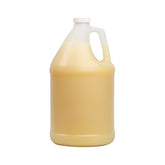
Soap making is a great way to get creative and enjoy natural homemade soap that suits your preferences or start your own business. But making bar soap or liquid soap from scratch using a traditional cold-process method is not for the faint-hearted, and it takes time to master the soap-making process. So, if you don’t want to work with lye (sodium hydroxide for bar soap and potassium hydroxide for liquid soap), you can use a soap base that has already been saponified and experiment with different recipes.
To help you get started, here we’ll talk about what soap base is, what pre-made soap bases are available, and where to buy them. We’ll also give you some tips on how to make soap with soap base.
What Is Soap Base?
Soap base refers to the unscented saponified base of any soap. Actually, it’s a finished soap that does not contain any scents, colors, or other additives, so it’s the best option for beginner soap makers as it allows you to save time and helps increase your chances of success.
Soap bases can be divided into solid and liquid. Solid bases are used for classic bar soap, and liquid ones are suitable for making hand soap, shower gels, shampoos, and other liquid soap products. Soft (creamy) soap bases are also used for making scrubs.
Solid (or melt and pour) soap bases can be white or transparent. White soap base, also known as opaque, contains titanium dioxide, which gives it a white color. The transparent soap base contains an added sugar alcohol blend that gives it a transparent appearance. Melt-and-pour soap bases often contain extra glycerin that helps keep the base soft and meltable, making it easy to work with.
Where to Buy Soap Base
If you want to start making homemade bar soap as a hobby and give it away as a handcrafted gift, you can purchase different pre-made melt-and-pour soap bases online. Melt-and-pour soap making can be a great way to express your creativity because you can choose interesting molds, mix different bases, and combine different scents and colors. It’s also a good option to involve kids in the process.
But since melt-and-pour soap bases contain extra glycerin, the soaps are prone to sweating and won’t last as long as traditional cold-process soap that we make at Botanie Soap and offer for private label use.
If you are interested in making your own liquid soap, on our online store, you can buy a wide range of natural liquid soap bases that you can use to create your scented liquid soap by adding your favorite essential oils and plant extracts.
Our liquid soap bases are made from premium blends of saponified oils of sunflower, coconut, and rosemary extract and have excellent cleaning and moisturizing properties. They also contain retained glycerin and are perfect for skin care. Our liquid soap bases are easy to work with and make natural soap according to your unique recipes. You can also use each of them as they are if you like unscented soap. For example, our unscented castile soap base is perfect for skin, hair, and general all-purpose use.
You can buy our soap bases made with certified organic ingredients in bulk starting from 1 gallon. We also offer liquid soap bases in 5-gallon buckets for those who want to start a soap-making business and sell their soap. Liquid soap bases cut down significantly on time but still allow you to create and customize high-quality liquid soap products.
How to Make Soap with Soap Base
If you want to make melt-and-pour soap, you must buy a soap base (usually sold in blocks), cut a small amount into small chunks, and melt it down using a heat-resistant container. Then, add the desired additives—essential oils, colorants, plant extracts, exfoliants, and more and mix them gently to prevent bubbles. Pour the mixture into a silicone mold and allow it to cool and harden for a few hours. Once the soap has set, take it out of the mold, and it is ready to be used or packaged.
Making soap with a liquid soap base is also easy. Just put the soap in a container, add essential oils and plant extracts, mix well, and transfer to bottles. Essential oils are usually added at 2% to 3% of the total. If you want to adjust the viscosity of your liquid soap base, you can thicken it by adding salt water in small amounts until you reach the consistency you desire.
Keep in mind that essential oils affect liquid soap in different ways. Sometimes, you don’t need salt water to thicken soap because your essential oil does the work for you. Essential oils can also affect the clarity and color of the liquid soap base. That’s why you should always test an essential oil to see how it performs before scenting a large amount of soap. Allow the mixture to sit overnight, and examine it the next day to see what happened.
A ready-made soap base makes it easy to start making soap with minimum hassles and complexities. It is helpful to follow existing proven recipes when you are a beginner. This will allow you to get some essential experience, and then you will be ready to experiment with your scent mixes. Combining soap bases with essential oils will allow you to create perfect scent combinations and make unique soap products.




